The recent news
Nov. 5, 2018
Publications
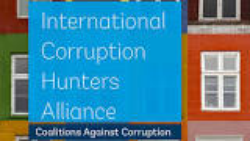
Sous l'égide de la Banque Mondiale, tous les deux ans, se réunit l' "Alliance des chasseurs de la corruption".
Les 25 et 26 octobre 2018, la rencontre se déroulait à Copenhague.
L'on pouvait suivre en direct les travaux de cette rencontre, qui demeurent ainsi disponibles.
L'on peut faire trois observations.
1. Tous stakeholders ! Sur le fond, l'on soulignera que, comme y a insisté au nom de la Banque Mondiale Pascale Dubois, elle-même en charge des politiques d'intégrité lors de la mise en place des programmes dans les pays, les actions contre la corruption bénéficient de plus en plus de l'action des entreprises, qui aujourd'hui voient leur réputation impliquée, réputation qu'elles perçoivent comme un actif à préserver ce qui justifie leur participation active à cette "Alliance". Cela renvoie à l'idée d'un "cercle de confiance" sur lequel repose la Compliance, même lorsqu'il y a contrainte exercée sur les entreprises, l'oratrice ayant abondamment parlé des programmes de compliance.
2. Une "Alliance" plutôt qu'un Ordre international inefficace ! Entre la forme et le fond, et bien que l'on puisse trouver grâce aux sites les précédentes rencontres biennales, le terme commun d' "Alliance" dans l'intitulé même d' International Corruption Hunters Alliance a de quoi retenir l'attention. En effet, dans l'ordre international ce sont les institutions internationales qui se rencontrent selon des formes codifiées, avec des textes, voire des accords, qui en résultent. Ici, nous avons des personnes "impliquées", à tous les titres : Etats, organisations publiques mais aussi entreprises et organisations non-gouvernementales. Comme le reflètent ce terme sans cesse utilisé par ces travaux de stakeholders, terme qui a la caractéristique pratique de pouvoir inclure tout le monde.
Il est vrai que la corruption est un fléau mondial qui concerne le particulier, les entités et les systèmes dont les institutions sont gardiennes : chacun peut donc à la fois en dire quelque chose et agir. Cette "Alliance" marque simplement le recul assumé d'un "ordre international" qui sans doute n'a pas pu se constituer à temps, alors que la criminalité trouve dans la globalisation un espace naturel, utilisant la fragmentation territoriale des Droits comme un bouclier que l'impératif de lutte ne semble plus pouvoir tolérer...
3. Tous "chasseurs" ! ou l'archaïsation du Droit de la Compliance. Le terme de "chasseurs" (hunters) est sur la forme plus encore remarquable. Cela rappelle le temps des "chasseurs de prime". Et c'est d'ailleurs parfois à ceux-ci que l'on compare les "moniteurs" dont l'efficacité est requise dans les techniques de programmes de compliance, leur exploits qu'ils relatent sur leur site étant parfois comparés à un "tableau de chasse" à la vue des entreprises terrassées. Cela n'est pas critiquable en soi. L'idée est qu'il faut pourchasser un fléau (la corruption étant implicitement comparée à une sorte de bête sauvage qui ravage tout).
Face à ce but, chacun est chasseur, l'entreprise comme l'ONG comme le tribunal comme le Gouvernement. Cela est de fait d'autant plus pertinent que sous un angle mondial la corruption s'étant infiltrée dans chaque catégorie, il convient sans doute de revenir à un tableau plus simple et plus archaïque : un fléau bien identifié (la corruption) et tout intéressé à l'éliminer dans une chasse "collective" (les intervenants ayant tous insisté sur ce caractère collectif).
Si on l'analyse du point de vue du droit, cela signe une nouvelle fois le mouvement d'archaïsation très fort du Droit de la Compliance, puisque les catégories juridiques s'effacent (par exemple la distinction entre l'entreprise privée et l'Etat) pour privilégier l'efficacité au regard d'un but.
Dans ce droit, dont Alain Supiot souligne notamment le caractère régressif et guidé par le principe de l'efficacité (qui n'est qu'un principe procédurale), pondéré par le principe de proportionnalité (qui n'est lui-aussi qu'un principe procédural), le Droit de la Compliance apparaît comme un Droit nouveau, dont il ne faut sans doute se contenter de viser comme seul principe l'efficacité.
En effet, et comme cela a été bien exposé à Copenhague, les criminels corrupteurs et corrompus ne connaissent plus les frontières dans leur activité mais les redécouvrent, utilisant la territorialité du Droit en défense lorsque des comptes leur sont demandés. La réponse du Droit est pour l'instant dans l'extraterritorialité des règles, les Etats se disputant alors, tandis qu'ils ne semblent s'accorder que dans l'informel des "alliances".
Tout cela montre l'urgence technique de concevoir d'une façon plus substantielle un Droit de la Compliance.
________
Nov. 5, 2018
Publications

Référence générale : Frison-Roche, M.-A., Banque et concurrence, in "Mélanges en l'honneur du professeur Claude Lucas de Leyssac", LexisNexis, 2018, pp.165-180.
Résumé : Banque et concurrence ne font pas bon ménage. Ce n'est pas tant que les banques feraient figure de récidivistes à propos desquels les autorités de concurrence devraient hausser le ton par des sanctions toujours plus lourdes afin que la leçon concurrentielle soit enfin entendue. Ce sont plutôt deux ordres qui s'affrontent, deux incompréhensions face à face. En effet les banques trouvent adéquat de s'entendre pour que le système bancaire fonctionne. Plus encore, les pouvoirs publics leur demandent un comportement politique en finançant l'économie lorsque celle-ci ne s'appuie pas sur les marchés financiers, voire de lutter contre l'exclusion sociale en pratiquant « l'inclusion bancaire », bastion avancé de la conception de l'entreprise promue par le Plan très politique d'Action pour la Croissance et le Transformation des Entreprises (PACTE). dès lors, comment elles-mêmes auraient-elles un comportement de marché consistant dans un comportement égoïste et d'agression envers leur homologue ?
Si l'on plonge dans ce creuset de l'incompréhension qui engendre le heurt violent entre les banques, qui évoquent leur mission, et les autorités de concurrence, qui se prévalent de la leur, on bute sur l'écueil de la définition même de ce qu'est une banque. L'on peut estimer qu'une banque est un prestataire de services divers, agissant sur des marchés en concurrence ; le droit assure le bon fonctionnement de ceux-ci, les autorités qui gardent l’efficacité des marchés se saisissant des banques qui y exercent leurs activités. Mais si l'on choisit d'insister sur le fait que les banques sont ce qui fait fonctionner l'économie et consolident le lien social, elles sont alors partie intégrante d'un système propre : le système bancaire, lequel est un élément essentiel de la société. La concurrence n'y est plus qu'adjacente.
Oct. 29, 2018
Blog

Une étudiante a fini par venir le raconter à Europe 1.
Le journal Marianne relaye le cas . Puis le journal La Croix. Les réseaux commencent à s'en émouvoir.
A l'Université Paris XIII, est organisé par une promotion d'étudiants un "week-end d'intégration".
Evénement fermé, événement festif: on est là pour s'amuser, faire connaissance, créer un "esprit de promotion.
dans un groupe fermé via Facebook, les étudiants discutent du thème à travers lequel ils vont s'amuser à se confronter. Et en trouvent un : les juifs et les nazis. Des noms sont proposés pour un tel jeu, qui va sans doute ressembler à chat-perché, puisque l'un des noms proposés est Rafle 2019, voire supposer des enfermements des étudiants attrapés puisque l'un des intitulés proposés est : Auschwitz 2019.
L'un des étudiants veut porter plainte pour antisémitisme,, en cela relayé par la direction de l'Université qui saisit le Procureur car l'antisémitisme est un délit, dont l'auteur doit répondre devant les tribunaux.,
Quelle est la défense des promoteurs de cette organisation organisée ? Elle est d'ores et déjà juridique. Comme le journal le relate : "les huit élèves mise en cause et convoqués par le vice-président plaident "l'humour".
Si l'on laisse de côté l'émoi que suscite ce type de cas, qu'en penser en Droit, au regard des faits, des notions et des jurisprudences accumulées ?
1. L'argument de l' "humour", c'est l'argument majeur avancé par tous les antisémites. Dieudonné, en premier. L'Ordonnance du Conseil d'Etat du 9 janvier 2014, Dieudonné M'Bala M'Bala a montré que l'humour, même estampillé puisque c'est la profession de celui tient des propos antisémites ne vaut pas carte blanche.
2. L'argument du jeu. L'argument est de plus en plus soutenu. Non pas dans un tel cadre, mais dans celui des "jeux vidéos", où le personnage d'Hitler entouré de personnages portant croix gammées peut depuis apparaître en tant que tel, depuis une décision de l'Autorité allemande de la régulation des jeux. L'argument principal est qu'il vaut bien des jeux licites et régulés, plutôt que pire encore dans le dark net", ce qui transposé dans notre cas produirait l'argument suivant : "il vaut mieux un jeu dans un cadre universitaire où la présidence peut intervenir que sans aucun cadre où plus rien n'est contrôlé". C'est l'argument de la "Régulation", par lequel l'argument de "l'encore pire" est censé nous faire tout accepter). Là encore, la jurisprudence est intervenue pour interdire la commercialisation de jeux vidéos, mettant en scène la Shoah, même le seul rôle disponible pour le joueur aurait été celui du "résistant".
3. L'argument du week-end d'intégration. L'argument relève de l'auto-régulation. Les étudiants font comme ils veulent, s'organisent entre eux, ce qu'ils ont fait. Cet argument "contextuel" est censé renforcer l'argument de l'humour : on se bat et l'on se pourchasse pour se détendre, pour mieux se réconcilier après avoir fait semblant d'être ennemis ; tout enfant sait cela. Mais en raison des termes et du sujet, et dans la mesure où les rôles sont déjà "distribués" à l'avance, l'argument se renforce : c'est bien plutôt vers un week-end de désintégration que cette promotion allait.
Il est vrai que les bizutages - parfois très violents, marquants, humiliants, blessants, notamment dans les filières de médecines, sont aujourd'hui remis en cause.
Et non, cela n'est pas drôle pour les victimes. Qui ne peuvent que "consentir".
Et non, aujourd'hui elles se plaignent. Ici, une jeune fille, étudiante en médecine, juive.
Et oui, aujourd'hui le Droit et le Procureur sont allés pour entraver ces jeux.
_________
Oct. 16, 2018
Teachings : Generall Regulatory law

Consulter les slides servant de support à la Leçon relative à la définition du Droit de la Régulation comme Équilibre entre la Concurrence et d'autres soucis.
Accéder au Plan général du Cours de Droit commun de la Régulation.
Se reporter à la présentation générale du Cours de Droit commun de la Régulation.
Consulter le Dictionnaire bilingue du Droit de la Régulation et de la Compliance.
Consulter la Bibliographie générale du Cours de Droit de la Régulation
Consulter la bibliographie ci-dessous, spécifique à cette Leçon relative au Régulateur
Résumé de la leçon.
Le Droit de la Régulation peut se construire dans la perspective de la concurrence, soit pour la construire, soit pour se placer comme simple béquille ou exception par rapport à son principe. Mais l'on peut, dans une conception plus politique concevoir le Droit de la Régulation comme un équilibre permanent, instable et à long terme entre le principe de concurrence et d'autres soucis, a-concurrentiels, voire anti-concurrentiels.
De la définition (souvent politique) de la Régulation, découle tout son régime juridique. En modifiant le régime du Droit de la Régulation, on obtient des changements politiques qui peuvent être majeurs.C'est pourquoi on se dispute tant pour savoir ce "qu'est" la Régulation, car concrètement le pouvoir est là.
Trois définitions sont admissibles et elles se superposent aujourd'hui, y compris en France.L'on peut concevoir la Régulation par rapport à la concurrence, qu'il s'agit d'un appareillage juridique de régulation pour obtenir concrètement à un système concurrentiel ou qu'il s'agisse d'injecter des doses bienvenu de concurrence dans un système organisé selon d'autres principes.La troisième définition est la plus complexe et sans doute la plus prometteuse. Il s'agit de la régulation comme mécanisme juridique d'équilibre entre le principe de concurrence et d'autres principes. Dans une telle définition, qui trouve illustration dans tous les secteurs régulés plus que jamais, se mélangent à la fois des considérations très techniques et des éléments purement politiques. Il en résulte des mécanismes juridiques paradoxaux. Cela constitue néanmoins un "droit commun". On est alors loin de l'idéal de concurrence.
Oct. 11, 2018
Blog

Ouest-France relaye une information juridique intéressante.
Les relations entre les joueurs de football et les clubs sont organisés par des contrats.
Selon la définition de ce qu'est un contrat, celles-ci fixent les obligations respectives des parties. Ainsi et par exemple le footballeur s'oblige à des comportements tandis que les clubs s'engagent notamment à payer celui-ci. Comment les contrats sont synallagmatiques, les obligations des uns font en quelque sorte face aux obligations des autres.
Or, sont insérées dans les contres des clauses expressément qualifiées de "clauses éthiques".
Par exemple dire bonjour au public est un comportement du footballeur y est visé. On pourrait dire qu'il s'agit d'une "clause de politesse", et il est usuel d'opposer la règle de Droit et la règle de politesse ....
Et y fait face une rémunération particulière. D'un montant qui peut être particulièrement élevé. Ainsi, dans ces contrats, il y aurait les obligations juridiques, rémunérées comme telles (jouer au foot) et les obligations a-juridiques, dont la rémunération est également stipulée d'une façon spécifique (éthique).
_____
L'on comprend bien la spécificité de ces clauses.
En effet, en premier lieu il n'est pas dans le métier de footballeur de dire bonjour ou d'applaudir le public lui-même. Dans ce dernier cas, il y a inversion des rôles car c'est au public d'applaudir et non pas au joueur. Dans le premier cas, c'est même le fait de se comporter comme une personne ordinaire, celle qui dit bonjour, qui répond à tous ceux qui l'acclament,. Une personne bien-élevée.
Mais pourquoi le prévoir contractuellement ?
Parce que le football est autant un spectacle qu'un sport.
Il est donc essentiel que les "vedettes" se comportent comme telles : soient en contact direct avec leur "public" qui les aiment et veulent avoir un "retour". Ainsi il convient qu'au-delà du sport ces personnes particulières, à savoir les "vedettes" de l'équipe, celles qui sont connues et aimées, aient le comportement attendu par le public, lequel viendra assister au match aussi, voire surtout, pour entrer en contact avec les stars du foot.
Pour que cela advienne, que ces stars saluent, leur parlent, les applaudissent, il convient que les clubs rémunèrent les stars qui marchent sur leur tapis vert. Et c'est l'objet de ces clauses.
L'on comprend plus difficilement la qualification "éthique" de ces clauses.
Ce qui est étonnant, c'est la qualification donnée à une telle disposition contractuelle.
En premier lieu, comme cela ne fait pas partie du "métier" de footballeur , sans doute le club ne peut pas "contraindre" le footballeur à dire bonjour ou à applaudir le public ... C'est sans doute aussi pour cela qu'en application directe de la théorie des "incitations" c'est une incitation financière directe qui est affectée à tel ou tel geste qui n'est pas un geste techniquement sportif.
Comme l'on ne sait pas qualifier un tel geste ainsi financièrement récompensé et techniquement décrit, alors on utilise le terme "éthique".... Il est "éthique" d'être aimable et empathique avec son public. Et cela mérite récompense. Comme cela fait penser aux contrats de GPA "éthique" qui prévoient pareillement des mouvements spontanés mais minutieusement décrits dans des contrats qui stipulent des contreparties financières.
Ne vaudrait-il pas mieux dire que dans le métier de footballeur, pour certains être un vedette fait aussi partie du métier et mérite rétribution ? Que cela n'est pas affaire d'éthique, mais d'adéquation à un désir du public qui paie pour cela, ce qui justifie le paiement de celui qui offre le spectacle ?
Car l'éthique, cela ne doit pas être ce qui permet de masquer la réalité.
Oct. 9, 2018
Conferences
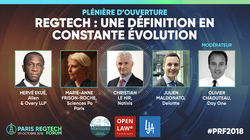
Référence générale : Frison-Roche, M.-A., Participation à la plénière d'ouverture : Regtech, une définition en constante évolution, in Cercle Montesquieu & Open Law en partenariat avec La LJA, La technologie pour une application efficace de la règlementation, Paris Regtech Forum, Paris, 9 octobre 2018.
Regarder la vidéo d'une partie de l'intervention de Marie-Anne Frison-Roche
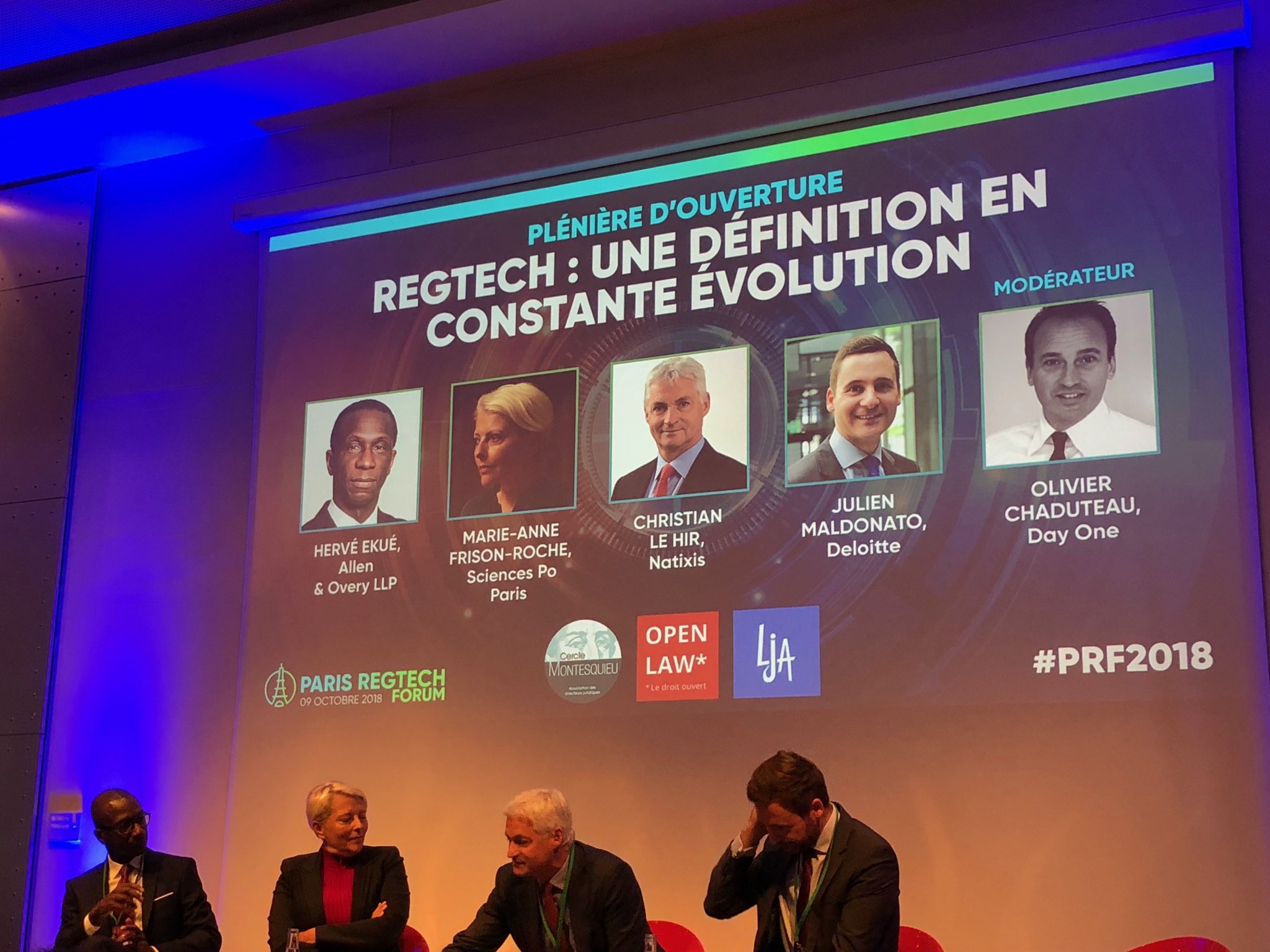
Lors du débat plénier qui ouvre la manifestation ont été abordées les questions suivantes : Qu’est-ce qu’une RegTech ? Quelles sont leurs applications ? Sont-elles les nouveaux business partners des directions juridiques… Pourquoi ne peut-on/doit-on pas les ignorer ?
Pour ma part, j'ai développé que
- les RegTech doivent distinguer des Fintech, non pas en tant qu'ils sont plus étroits que ceux-ci, mais au contraire plus larges. Ils ne doivent pas se limiter à la "réglementation" d'une part et ne doivent en rien se limiter aux secteurs bancaire et financier, mais se saisir de tous les autres secteurs, notamment énergétique, télécom ou pharmaceutique, voire aller dans le transversal comme l'environnement.
- Plus encore les RegTech sont en lien avec la "Compliance", laquelle n'est pas davantage une sous-partie des "RegTech" et c'est pour cela qu'il est approprié de développer d'une façon articulée mais autonome des "ComplianceTech" ou "ComplyTech", en tant que celles-ci doivent pouvoir par la technologie mais sans se dissoudre dans celles-ci centrer l'acculturation dans l'entreprise et par l'entreprise de ce qu'il continue de continuer à appeler le Droit (et non pas la "réglementation") à savoir la préservation des êtres humains et de ce dont ils ont souci : la préservation de la nature et des autres êtres humains.

Oct. 4, 2018
Publications
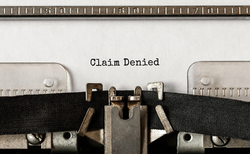
This working paper serves as the basis for an intervention in the conference held at the Collège de France.
Read the presentation of this conference (made in French).
SUMMARY :
For the moment, Compliance can be considered as almost "nothing" because in Europe Compliance is just a "reaction", verty technical, costly and empty against the U.S.(I). And for the moment, we only see one accumulation of mechanical sectorial constraints guided by the concern of efficiency, without associating this to the construction of the Europe .(II) On the contrary, what is before us, the tools and actors being already available : formulating the political goal of the Compliance Law: building Europe, a market where the center is the Person (III.
Oct. 4, 2018
Conferences
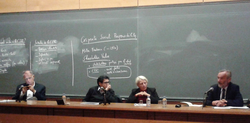
Référence complète : Frison-Roche, M.-A., Comment le Droit de la Compliance peut aider d'une façon décisive à la construction de l'Europe, in Cycle de conférences du Journal of Regulation & Compliance, Pour une Europe de la Compliance, "Convergence de l'Économie et du Droit dans l'Europe de la Compliance".
Consulter le programme complet de la conférence.
Consulter le document de travail bilingue sur la base duquel la conférence a été construite.